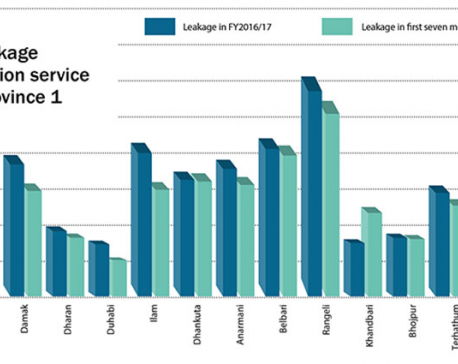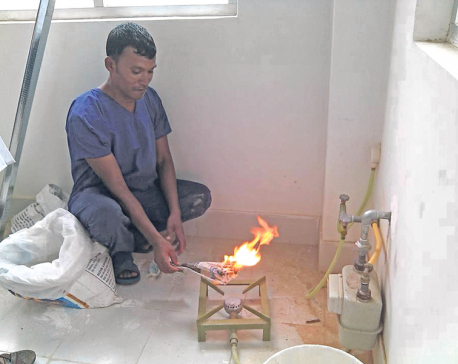
OR
Electricity supplied through dedicated feeders
Industrialists oppose paying pending bills
Published On: December 2, 2019 12:13 PM NPT By: Republica | @RepublicaNepal
KATHMANDU, Dec 2: Industrialists have been lobbying with the government to revisit its decision to recover pending bills of electricity supplied to industrial units through dedicated feeders and trunk lines.
In June 2015, a board meeting of the Nepal Electricity Authority (NEA) had set a premium tariff for factories using electricity through dedicated feeders and trunk lines from August that year. Citing power outage problem at that time, the NEA had decided to impose additional fee on industries that consume high amount of energy.
According to the NEA, it is still to recover around Rs 10 billion in outstanding dues from different industries. However, industrialists have been voicing their disagreement over the decision stating that it was not appropriate for the NEA to levy additional fee as load-shedding has already become a thing of past.
The power utility had announced end of scheduled power cuts in the Kathmandu Valley from November 2016 – a year after it started imposing the premium charge.
But the state-owned power utility has been stating that it is firm in its decision to recover the dues. Rather, the authority has said it would allow industrialists to pay the dues in installments.
Speaking at an interaction organized by the Confederation of Nepalese Industries (CNI) on Sunday, the industrialists put forth their demand before the newly-appointed Minister for Industry, Commerce and Supplies Lekh Raj Bhatta. Shiva Ratan Sharda, member of governing council of the CNI, claimed in the interaction that it was not appropriate on the part of NEA to pay electricity bills of five years ago.
Sharda also expressed dissatisfaction over the government’s preparation to raise electricity tariff. According to him, a number of hydropower projects, such as Butwal Power Company, will be handing over their major shares to the NEA by next year. “As the move will bring down electricity production costs for the authority, the government body should reduce the tariff rate instead of increasing it,” he added.
Industrialists argue that they could not use the electricity supplied through dedicated feeders in full capacity due to ongoing load-shedding hours at that time. CNI President Satish Kumar More said in the interaction that traders were levied tariff rate of up to Rs 15 per unit compared to the normal supply rate of Rs 8.30-Rs 9 per unit. “Despite charging high tariff, the authority provided electricity for 8-9 hours a day only,” added More.
Responding to the industrialists, Minister for Industry, Commerce and Supplies said that the NEA decided to recover the outstanding dues after carrying out series of study.
The industrialists also complained on the quality of electricity supplied to them, stating that it does not have proper voltage to run production plants.
“Although the government has maintained regular power supply, the quality of power is too poor to operate factories,” said Hari Bhakta Sharma, past president of CNI. He also said that lack of coordination among government ministries was hindering the growth of manufacturing business.
Allowing the CNI to issue certificate of origin for goods exported to India and China, addressing the persistent problem of liquidity crisis in banking system, implementing separate policy for the strategic industries and production sectors that are being self-reliant and establishing recycling plants for plastic products were among the demands of the industrialists.
You May Like This

Electricity leakage in Province 1 down by 4 percentage points: Nepal Electricity Authority
KATHMANDU, March 14: Leakage and technical loss of electricity in Province 1 has decreased by 3.91 percentage points to 13.74 percent... Read More...

Mustang starts generating electricity from wind
POKHARA, August 17: Mustang district has started generating electricity from wind, tapping in the potential which the mountainous district holds... Read More...

Bharatpur Hospital using biowaste to generate electricity
CHITWAN, July 21: Bharatpur Hospital has installed a biogas plant to convert wastes into energy to manage municipal wastes. ... Read More...







Just In
- Rain shocks: On the monsoon in 2024
- Govt receives 1,658 proposals for startup loans; Minimum of 50 points required for eligibility
- Unified Socialist leader Sodari appointed Sudurpaschim CM
- One Nepali dies in UAE flood
- Madhesh Province CM Yadav expands cabinet
- 12-hour OPD service at Damauli Hospital from Thursday
- Lawmaker Dr Sharma provides Rs 2 million to children's hospital
- BFIs' lending to private sector increases by only 4.3 percent to Rs 5.087 trillion in first eight months of current FY












Leave A Comment